托福写作范文:探索太空是否是资源浪费
Space exploration 太空探索的花销是否合理 英语作文
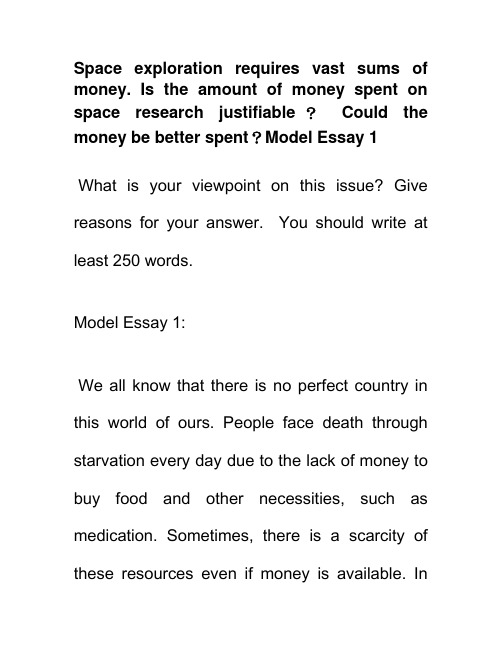
Space exploration requires vast sums of money. Is the amount of money spent on space research justifiable?Could the money be better spent?Model Essay 1What is your viewpoint on this issue? Give reasons for your answer. You should write at least 250 words.Model Essay 1:We all know that there is no perfect country in this world of ours. People face death through starvation every day due to the lack of money to buy food and other necessities, such as medication. Sometimes, there is a scarcity of these resources even if money is available. Inmy view, it is wrong for governments to spend enormous funds on their space exploration and astrophysics programs when there are poor people who are hungry and sick in their various countries.I believe that governments should make it a priority to spend money on providing the basic needs of people here on Earth before they use it for research towards exploring other planets. First of all, regardless of what country they may happen to live in - all people require food, clean water/sanitation, shelter and medication to protect themselves from viruses and bacterialinfections. Apart from these most basic and fundamental requirements, people also need a good education so that they can find stable jobs in order to support themselves and their families. Instead of allocating additional funding for space exploration, governments should realise the importance of maintaining a healthy populace. For example, the USA has spent more than 23 billion dollars in the last 30 years on research, rather than spending it on the basic needs of its citizens.Moreover, in America, there are over 6 million homeless people and more than 2 million otherswho have lost their houses because of foreclosure. Also, there are more than 5 million people who are HIV-positive and in need of treatment. If the U.S. Government would decide to spend an equal amount of money on medical research as it does on its space program, then scientists might be able to find better treatments for this devastating disease so that many lives could be saved.Secondly, many people in Africa have a lack of food, clean water and electricity. I believe that we have a moral and ethical duty to help Africa and other poor countries around the world. It isworthier to help those who share our own planet before we travel to the moon. As for myself, I did my pharmacy internship in Egypt, where I witnessed many examples of why it would be wise for the government to spend more money in the area of medical / pharmaceutical research. Many people there face pain and death every day because of the Hepatitis C Virus. This insidious virus is responsible for causing the deaths of more than 1 million people in Africa each year. The cost of medication to treat it is very high -- approximately 20,000 dollars per patient. On the other hand, Egypt has spent more than 200 million dollars on spaceexploration and researching other planets. I think that it would have been a much smarter choice for them to have used the money to provide medication for those who could not afford it.In summary, it is my viewpoint that governments should concentrate on solving their own internal problems by offering their citizens the basic requirements of life such as food, clean water/sanitation, shelter and medication. They should use any excess money for improving the lives of their inhabitants by providing them with educational opportunities sothat they can find decent jobs in order to become independent. It is important to fund academic pursuits such as space exploration and research in the field of Astrophysics, of course, but not at the expense of the lives of human beings who live on this planet.Model Answer 2:There has always been considerable discussion and debate about whether governments in many countries should spend taxpayers’ money on space research. In my view, it is impossible to justify the amount of money spent on space research. Generally speaking, the main reasonfor this position is that there are several areas in which the money could be invested better. When we have so many problems and hungry people in the Earth, spending money on space is not a good choice at all.The first point to make is that governments have a responsibility to spend public money on projects that bring a benefit to the citizens. This has not been the case with space research as most developments have been limited to helping astronauts in space or have been very specialised. For example, it is not of great value to the general public that we now have pens andbiros that can write upside down. This does not merit the huge amount of money spent. Little success has been made so far on space exploration except landing on the Moon or knowing that Mars had once been a place for living being. What good that can bring to people who are starving in many countries?The second point to make is that there are many much more urgent projects on Earth that require investment. If governments spent less money on space research, then they would be able to help solve some of these problems such as population control, elimination of diseaseslike cholera, global warming and food shortages. It seems to me that all of these issues are more important because they affect the lives of millions of ordinary people. An illustration of this is that the US government could provide food for all the starving people in the world if they did not spend so much on NASA.My conclusion is that politicians should not fund space research. The grounds for saying this are that it is very costly and provides little real benefits. Furthermore, there are several more urgent issues that need to be funded.。
是否应该进行太空探索英语作文雅思
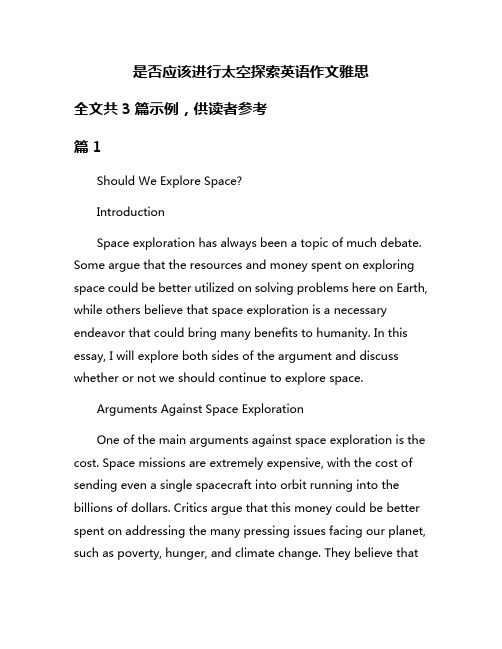
是否应该进行太空探索英语作文雅思全文共3篇示例,供读者参考篇1Should We Explore Space?IntroductionSpace exploration has always been a topic of much debate. Some argue that the resources and money spent on exploring space could be better utilized on solving problems here on Earth, while others believe that space exploration is a necessary endeavor that could bring many benefits to humanity. In this essay, I will explore both sides of the argument and discuss whether or not we should continue to explore space.Arguments Against Space ExplorationOne of the main arguments against space exploration is the cost. Space missions are extremely expensive, with the cost of sending even a single spacecraft into orbit running into the billions of dollars. Critics argue that this money could be better spent on addressing the many pressing issues facing our planet, such as poverty, hunger, and climate change. They believe thatthe resources used for space exploration could be more effectively utilized to improve the lives of people here on Earth.Another argument against space exploration is the lack of immediate benefits. Critics argue that the technology developed for space missions, such as satellites and rockets, has very limited applications outside of space exploration. They believe that the benefits of space exploration do not justify the enormous cost and effort involved.Arguments For Space ExplorationDespite the arguments against space exploration, there are many who believe that it is a worthwhile endeavor. One of the main arguments in favor of space exploration is the potential for scientific discovery. Space has always been a source of fascination for humans, and exploring it can lead to new insights and discoveries that could benefit humanity as a whole. For example, space missions have led to the development of new technologies and materials that have had applications beyond space exploration.Another argument in favor of space exploration is its potential to inspire and unite people. The idea of exploring the unknown and reaching for the stars has always captured the imagination of people around the world. Space missions havethe power to inspire young people to pursue careers in science and technology, and can bring nations together in pursuit of a common goal.ConclusionIn conclusion, the question of whether or not we should explore space is a complex one with no easy answers. While there are valid arguments against space exploration, such as the high cost and lack of immediate benefits, there are also compelling arguments in favor of it, such as the potential for scientific discovery and the ability to inspire people. Ultimately, whether or not we should explore space will depend on how we balance the costs and benefits of such endeavors. In my opinion, space exploration is a valuable and important endeavor that has the potential to bring many benefits to humanity.篇2Should We Pursue Space Exploration?Space exploration has long been a topic of fascination for humanity. From the first Moon landing in 1969 to the recent Mars rover missions, the idea of exploring the vast expanse of outer space has captured the imaginations of people around theworld. However, the question remains: should we continue to invest time, resources, and energy into space exploration?There are compelling arguments on both sides of the debate. Proponents of space exploration argue that it is essential for scientific advancement and discovery. By exploring other planets, moons, and celestial bodies, we can gain a better understanding of the universe and our place within it. Additionally, studying other planets and moons can provide valuable insights into Earth's own history and future. For example, studying Mars could help us better understand the possibility of colonization or the search for extraterrestrial life.Furthermore, space exploration can inspire future generations of scientists, engineers, and astronauts. The Moon landing of 1969 sparked a wave of interest in STEM fields, leading to advancements in technology and knowledge that have shaped the modern world. By continuing to push the boundaries of space exploration, we can inspire the next generation to pursue careers in science and technology.On the other hand, critics of space exploration argue that the resources spent on space missions could be better allocated to solving problems here on Earth. With issues such as climate change, poverty, and inequality facing our planet, some arguethat investing in space exploration is a luxury we cannot afford. Additionally, the costs of space missions are often exorbitant, with little immediate return on investment.However, proponents of space exploration counter these arguments by pointing out the many practical benefits that space exploration has brought to our daily lives. From the development of satellite technology to the creation of new materials and medical advancements, the innovations that have come from space exploration have had far-reaching impacts on society. Additionally, the pursuit of space exploration has pushed the boundaries of human knowledge, leading to discoveries that have fundamentally changed our understanding of the universe.In conclusion, the question of whether we should continue to pursue space exploration is a complex and multifaceted one. While there are valid arguments on both sides of the debate, it is clear that space exploration has brought numerous benefits to society and has the potential to continue to do so in the future. By investing in space exploration, we can continue to push the boundaries of human knowledge, inspire future generations, and pave the way for a brighter future for all of humanity. Ultimately, the pursuit of space exploration is a worthwhile endeavor thatholds the promise of unlocking the mysteries of the universe and shaping the course of human history for generations to come.篇3Should We Explore Space?With the advancement of technology, the idea of space exploration has captured the imagination of many people around the world. Some argue that we should continue to explore and expand into space, while others believe that we should focus on issues here on Earth. In this essay, I will discuss both sides of the debate and provide my own opinion on whether or not we should explore space.Those in favor of space exploration argue that it is essential for the progress and development of humanity. They believe that exploring space can lead to new discoveries, advancements in technology, and a better understanding of the universe. Additionally, they argue that space exploration can inspire future generations and foster innovation in science and technology. For example, the Apollo missions to the moon in the 1960s and 1970s are often cited as a testament to the power of human ingenuity and determination.Furthermore, proponents of space exploration argue that investing in space exploration can have economic benefits. For instance, space missions can create jobs and stimulate economic growth in the aerospace industry. Additionally, the technologies developed for space exploration, such as satellite communication and GPS, have practical applications that benefit society as a whole.On the other hand, critics of space exploration argue that it is a waste of resources and money that could be better spent on addressing issues here on Earth. They point to the high cost of space missions, such as the International Space Station, which has cost billions of dollars to build and maintain. They argue that this money could be better spent on solving global issues such as poverty, hunger, and climate change.Critics also argue that space exploration is often driven by political and nationalistic motivations rather than scientific curiosity. For example, the Space Race between the United States and the Soviet Union during the Cold War was fueled by political rivalry rather than a genuine desire to explore and discover.In my opinion, I believe that space exploration is an important endeavor that should be pursued. While it is true that there are many pressing issues here on Earth that requireattention and resources, I believe that exploring space can also have significant benefits for humanity. As we continue to explore and understand the universe, we can gain insights into our own planet and the challenges we face. Additionally, space exploration can inspire future generations to pursue careers in science and technology, leading to innovation and progress in these fields.In conclusion, the debate over whether or not we should explore space is complex and multifaceted. While there are valid arguments on both sides, I believe that the benefits of space exploration outweigh the costs. By continuing to explore and expand into space, we can unlock new discoveries, technologies, and opportunities that can benefit humanity as a whole.。
关于太空探索的利与弊的作文英语
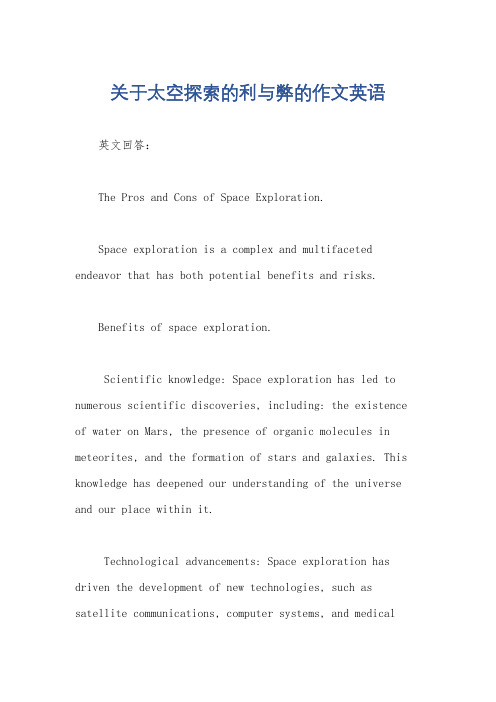
关于太空探索的利与弊的作文英语英文回答:The Pros and Cons of Space Exploration.Space exploration is a complex and multifaceted endeavor that has both potential benefits and risks.Benefits of space exploration.Scientific knowledge: Space exploration has led to numerous scientific discoveries, including: the existence of water on Mars, the presence of organic molecules in meteorites, and the formation of stars and galaxies. This knowledge has deepened our understanding of the universe and our place within it.Technological advancements: Space exploration has driven the development of new technologies, such as satellite communications, computer systems, and medicaldevices. These technologies have had a profound impact on our daily lives and have improved our quality of life.Economic growth: Space exploration has created new industries and jobs, stimulating economic growth. The development of new technologies and the exploration of extraterrestrial resources have the potential to create wealth and prosperity.Inspiration and education: Space exploration inspires awe and wonder, fueling our imagination and curiosity. It also provides a unique opportunity to educate the public about science, technology, and the environment.Risks of space exploration.Cost: Space exploration is an expensive undertaking that requires significant financial resources. Governments and private entities must weigh the costs of space exploration against other priorities, such as healthcare, education, and poverty reduction.Safety: Space exploration is a dangerous activity that poses risks to human life. Astronauts face the hazards of radiation, zero gravity, and isolation. Unforeseen events, such as equipment failures or collisions with space debris, can also threaten the safety of space missions.Environmental impact: The launch and re-entry of spacecraft can release pollutants into the atmosphere. Space exploration also contributes to the generation of space debris, which poses a hazard to satellites and future space missions.Political tensions: Space exploration can become entangled in political rivalries and tensions between nations. Competition for resources and technological dominance can lead to conflict and undermine international cooperation.Conclusion.Space exploration offers both potential benefits and risks. It is important to carefully consider these factorswhen making decisions about the scope and direction of future space missions. By weighing the pros and cons, we can harness the power of space exploration to advance scientific knowledge, drive innovation, and inspire generations to come.中文回答:太空探索的利与弊。
【托福写作】满分范文-探索太空是否是资源浪费
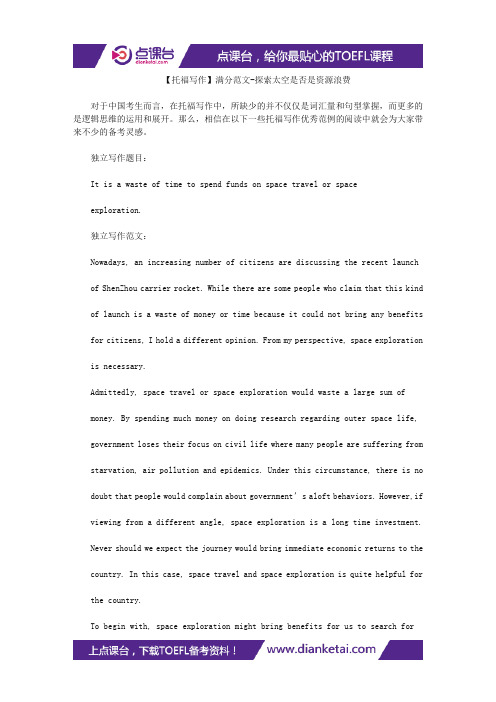
【托福写作】满分范文-探索太空是否是资源浪费对于中国考生而言,在托福写作中,所缺少的并不仅仅是词汇量和句型掌握,而更多的是逻辑思维的运用和展开。
那么,相信在以下一些托福写作优秀范例的阅读中就会为大家带来不少的备考灵感。
独立写作题目:It is a waste of time to spend funds on space travel or spaceexploration.独立写作范文:Nowadays, an increasing number of citizens are discussing the recent launchof ShenZhou carrier rocket. While there are some people who claim that this kindof launch is a waste of money or time because it could not bring any benefitsfor citizens, I hold a different opinion. From my perspective, space explorationis necessary.Admittedly, space travel or space exploration would waste a large sum ofmoney. By spending much money on doing research regarding outer space life,government loses their focus on civil life where many people are suffering fromstarvation, air pollution and epidemics. Under this circumstance, there is nodoubt that people would complain about government’s aloft behaviors. However,ifviewing from a different angle, space exploration is a long time investment.Never should we expect the journey would bring immediate economic returns to thecountry. In this case, space travel and space exploration is quite helpful forthe country.To begin with, space exploration might bring benefits for us to search fornew energy resource. That is to say, other planets may be rich in certain kindsof resources that are in great shortage on the earth. According to the report released after the exploration to the Mars, the officials from NASA confirms that Mars contains a great volume of natural gas and iron. Moreover, engineershave also noticed that these resources on the planet are able to explore, and ifthey could solve the problem of long time transportation, these resources could be used on the earth. Consequently, the use of natural gas will not consume burning of petroleum and make our planet a better place to live in.In addition, space exploration aims to improve level of technology. In other words, it is the development of advanced technology that makes it possible to explore the outer space. It is usually the case that without the technology of launching satellite into the space, it is impossible for people to conduct research. As a result, scientists have to improved their knowledge in related areas so that they could guarantee the launch of these rockets, as well as satellites. Meanwhile, to ensure astronauts’ safety in the outer space, scientists have to repeated work on their suits in order to keep astronauts away from radioactivity. Also, to fill with enough oxygen, scientists have to run encapsulation tests again and again. Only if these equipment are guaranteed can astronauts be safely working in the outer space.To sum up, the seemly useless space exploration would cost a large sum of money; however, this space activity could still bring benefits in both newenergy searching and technology improvement.。
太空探险是否值得英语作文
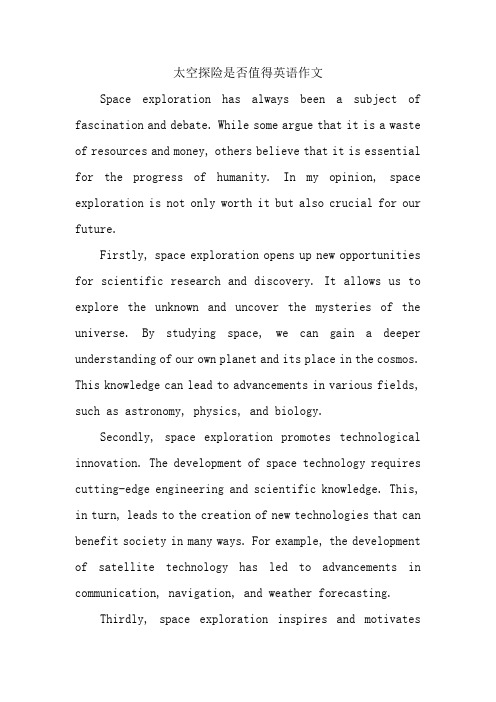
太空探险是否值得英语作文Space exploration has always been a subject of fascination and debate. While some argue that it is a waste of resources and money, others believe that it is essential for the progress of humanity. In my opinion, space exploration is not only worth it but also crucial for our future.Firstly, space exploration opens up new opportunities for scientific research and discovery. It allows us to explore the unknown and uncover the mysteries of the universe. By studying space, we can gain a deeper understanding of our own planet and its place in the cosmos. This knowledge can lead to advancements in various fields, such as astronomy, physics, and biology.Secondly, space exploration promotes technological innovation. The development of space technology requires cutting-edge engineering and scientific knowledge. This, in turn, leads to the creation of new technologies that can benefit society in many ways. For example, the development of satellite technology has led to advancements in communication, navigation, and weather forecasting.Thirdly, space exploration inspires and motivatesfuture generations. It ignites a sense of curiosity and wonder in children and young adults, encouraging them to pursue careers in science, technology, engineering, and mathematics (STEM). By inspiring the next generation of scientists and engineers, space exploration can contribute to the continued progress of humanity.Fourthly, space exploration fosters international cooperation and collaboration. The exploration of space requires the collective efforts of countries around the world. This collaboration can lead to improved relations and understanding between nations, promoting peace and stability.In conclusion, space exploration is not only worth it but also crucial for our future. It opens up new opportunities for scientific research, promotes technological innovation, inspires future generations, and fosters international cooperation. By investing in space exploration, we can contribute to the continued progress of humanity and pave the way for a better future.中文翻译:太空探险一直是令人着迷和争议的话题。
太空探索是不是浪费钱?Is the Space is a Huge Waste of Money-(大学英语作文)
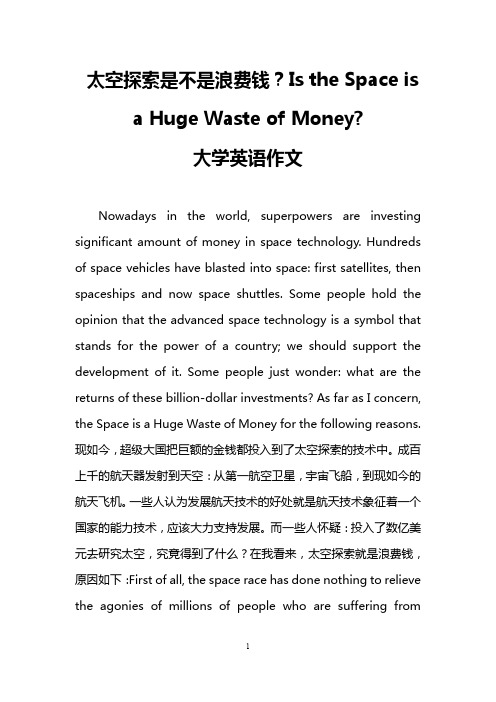
太空探索是不是浪费钱?Is the Space isa Huge Waste of Money?大学英语作文Nowadays in the world, superpowers are investing significant amount of money in space technology. Hundreds of space vehicles have blasted into space: first satellites, then spaceships and now space shuttles. Some people hold the opinion that the advanced space technology is a symbol that stands for the power of a country; we should support the development of it. Some people just wonder: what are the returns of these billion-dollar investments? As far as I concern, the Space is a Huge Waste of Money for the following reasons.现如今,超级大国把巨额的金钱都投入到了太空探索的技术中。
成百上千的航天器发射到天空:从第一航空卫星,宇宙飞船,到现如今的航天飞机。
一些人认为发展航天技术的好处就是航天技术象征着一个国家的能力技术,应该大力支持发展。
而一些人怀疑:投入了数亿美元去研究太空,究竟得到了什么?在我看来,太空探索就是浪费钱,原因如下:First of all, the space race has done nothing to relieve the agonies of millions of people who are suffering fromserious disease, poverty and wars. Some countries just want to explore space in order to maintain their status quo. They think the more space launch into the sky, the more power a country’s have. For centuries human beings have been playing many different power games: wars, cold wars, allies, nuclear armament, and the space race is just an extension of the race for power on earth.首先,太空竞赛并不能减轻数百万人口所遭受到的疾病、贫穷和战争所带来的痛苦。
雅思英语作文 把钱花在太空探索上完全是浪费吗 space exploration

With all the problems in the world today, spending money on space exploration is a complete waste. The money could be better spent on other causes.To what extent do you agree with this view?Give reasons for your answer and give any relevant example or experience you have to support your answer.You should write at least 250 words.Model Essay 1:Many developing and developed countries are spending huge amounts of money on space exploration. They are keenly interested in findingout the existence of life on galaxies and stars. This is a lengthy process, which required huge funds and time. People argue that space exploration is a waste of time and money. This amount should be spent on other problems.I believe that helping and improving living standard of poor nations is the best way to use the money. Rich nations play a pivotal role in bringing change and prosperity for poor nations. Developing countries such as Africa, Syria etc. have serious problems in health, education and employment sectors. That could only be solved with the help of developed nations. Manycountries are giving financial aids and others are investing directly in order to solve and mitigate the woes of peoples and received respect and gratitude in this regard.However, discovering unresolved mysteries is a real challenge for the scientist. Many countries are funding research centres to unfold hidden mysteries of the world. This is time consuming and lengthy work. Scientists are in search of natural resources that are less in quantity on earth. Their success could substantially change the world and will open a new horizon of success.To conclude, I believe that it is an ethical and moral responsibility of nations to eradicate problems in their neighbouring countries. Meanwhile, research on space exploration should be continued until we get desired results. It is a time-consuming process but it will leave undeniable benefits on people lives in case of success.。
太空探险的意义利与弊英语作文
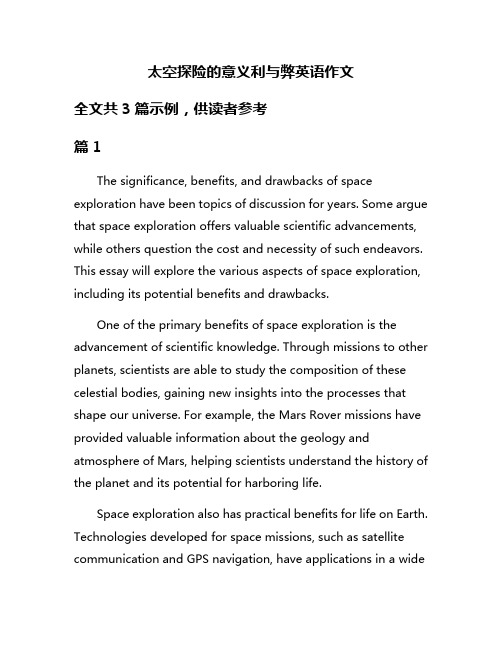
太空探险的意义利与弊英语作文全文共3篇示例,供读者参考篇1The significance, benefits, and drawbacks of space exploration have been topics of discussion for years. Some argue that space exploration offers valuable scientific advancements, while others question the cost and necessity of such endeavors. This essay will explore the various aspects of space exploration, including its potential benefits and drawbacks.One of the primary benefits of space exploration is the advancement of scientific knowledge. Through missions to other planets, scientists are able to study the composition of these celestial bodies, gaining new insights into the processes that shape our universe. For example, the Mars Rover missions have provided valuable information about the geology and atmosphere of Mars, helping scientists understand the history of the planet and its potential for harboring life.Space exploration also has practical benefits for life on Earth. Technologies developed for space missions, such as satellite communication and GPS navigation, have applications in a widerange of industries, from telecommunications to agriculture. Additionally, the study of space can help us better understand and prepare for potential threats, such as asteroid impacts or solar flares, that could have catastrophic consequences for our planet.Furthermore, space exploration can inspire and educate future generations. The achievements of space agencies like NASA and SpaceX capture the imagination of people around the world, encouraging young minds to pursue careers in science, technology, engineering, and mathematics. Educational programs and outreach initiatives help to foster an interest in space exploration and inspire the next generation of scientists and engineers.Despite these benefits, space exploration also has its drawbacks. One of the most significant concerns is the cost of space missions, which can run into billions of dollars. Critics argue that this money could be better spent on addressing pressing issues on Earth, such as poverty, climate change, and healthcare. Additionally, the risks associated with space travel, such as radiation exposure and isolation, raise ethical questions about the safety and well-being of astronauts.Another drawback of space exploration is the environmental impact of space debris. The debris left behind by satellites and spacecraft poses a risk to other orbiting objects, such as the International Space Station, and can contribute to the growing problem of space pollution. Efforts to mitigate this issue, such as the development of cleaner propulsion technologies and the removal of debris from orbit, are ongoing but require investment and collaboration from space agencies and commercial operators.In conclusion, the significance of space exploration lies in its potential to expand our scientific knowledge, advance technologies, and inspire future generations. While there are drawbacks to consider, such as the cost and environmental impact of space missions, the benefits of exploring the cosmos outweigh these concerns. By continuing to support and invest in space exploration, we can unlock the mysteries of the universe and pave the way for a brighter future for humanity.篇2The Significance, Pros, and Cons of Space ExplorationIntroductionSpace exploration has captured the imagination of humanity for decades. From the first human landing on the moon to the exploration of Mars and beyond, space exploration has brought forth immense technological advancements and scientific discoveries. However, the pursuit of space exploration also comes with its own set of challenges and controversies. In this essay, we will explore the significance, pros, and cons of space exploration.Significance of Space ExplorationSpace exploration has had a profound impact on human society. It has sparked innovation in various fields, such as engineering, technology, and materials science. For example, the development of lightweight materials used in spacecraft has led to advancements in industries such as aviation and automotive. Space exploration has also resulted in the creation of new technologies, such as satellite communications, GPS, and weather forecasting systems, which have revolutionized our daily lives.Furthermore, space exploration plays a crucial role in expanding our understanding of the universe. By exploring other planets, moons, and celestial bodies, scientists are able to study the origins of the solar system and the possibility of life beyondEarth. The exploration of Mars, for instance, has provided valuable insights into the planet's geological history and potential habitability.Pros of Space Exploration1. Technological Advancements: Space exploration drives innovation in technology, leading to the development of new materials, propulsion systems, and communication technologies that benefit society as a whole.2. Scientific Discoveries: Space exploration expands our knowledge of the universe and provides insights into the origins of life and the potential for extraterrestrial life.3. Economic Benefits: Space exploration stimulates economic growth by creating jobs, fostering collaboration between industries, and generating revenue through the commercialization of space technologies.4. Inspiration and Education: Space exploration inspires the next generation of scientists, engineers, and explorers, encouraging them to pursue careers in STEM fields and contribute to the advancement of human knowledge.Cons of Space Exploration1. Cost: Space exploration is a costly endeavor that requires significant financial investment from governments and private organizations. Critics argue that these resources could be better spent addressing pressing issues on Earth, such as poverty, healthcare, and climate change.2. Environmental Impact: The launch and operation of spacecraft can have negative environmental effects, such as the release of pollutants into the atmosphere and the generation of space debris that poses a threat to satellites and space missions.3. Ethical Concerns: Some people raise ethical concerns about the potential exploitation of outer space resources, the impact of space colonization on indigenous life forms, and the militarization of space.ConclusionSpace exploration has both pros and cons, and it is essential to weigh the benefits against the challenges. While space exploration has provided numerous technological advancements, scientific discoveries, and economic benefits, it also comes with its own set of costs and ethical considerations. As we continue to explore the cosmos, it is crucial to address these challenges responsibly and ensure that the benefits of space exploration outweigh the potential drawbacks. Ultimately, space explorationhas the potential to unite humanity in the pursuit of knowledge and inspire us to reach for the stars.篇3The Significance, Benefits, and Drawbacks of Space ExplorationIntroductionSpace exploration has fascinated mankind for centuries, with humans dreaming about venturing beyond our planet and reaching the stars. In recent history, technological advancements have made space exploration a reality, allowing astronauts to travel to the moon, Mars, and beyond. However, the quest for exploring space comes with both benefits and drawbacks, which need to be carefully considered.Significance of Space ExplorationThe exploration of space holds immense significance for humanity as a whole. Firstly, it allows us to expand our knowledge of the universe and uncover its mysteries. By studying other planets, stars, and galaxies, scientists can gain insight into fundamental questions about the origins of the universe, the existence of extraterrestrial life, and the possibilities for human colonization of other worlds.Secondly, space exploration has led to numerous technological advancements that benefit society on Earth. For example, advancements in communication satellites, weather forecasting, and medical imaging have all been made possible by space exploration. These technologies have improved our quality of life and contributed to economic growth and prosperity.Furthermore, space exploration has the potential to inspire future generations of scientists, engineers, and explorers. Seeing astronauts travel to other worlds and conduct groundbreaking research can ignite a passion for space exploration in young people and inspire them to pursue careers in STEM fields.Benefits of Space ExplorationThere are numerous benefits that come from space exploration, both for humanity as a whole and for individuals. One of the most significant benefits is the potential for expanding our understanding of the universe and our place within it. By studying other planets, stars, and galaxies, scientists can gain insight into the origins of the universe, the existence of extraterrestrial life, and the possibilities for human colonization of other worlds.Additionally, space exploration has led to the development of numerous technologies that benefit society on Earth. Forexample, advancements in communication satellites, weather forecasting, and medical imaging have all been made possible by space exploration. These technologies have improved our quality of life and contributed to economic growth and prosperity.Furthermore, space exploration has the potential to inspire future generations of scientists, engineers, and explorers. Seeing astronauts travel to other worlds and conduct groundbreaking research can ignite a passion for space exploration in young people and inspire them to pursue careers in STEM fields.Drawbacks of Space ExplorationDespite the many benefits of space exploration, there are also drawbacks that must be considered. One of the main drawbacks is the high cost associated with space missions. Building rockets, spacecraft, and supporting infrastructure is expensive, and the cost of sending astronauts into space is often prohibitive.Another drawback is the potential for accidents and mishaps during space missions. Space exploration is inherently risky, and astronauts face a variety of hazards, including radiation exposure, mechanical failures, and human error. The loss of life and equipment during space missions can be devastating and raise questions about the value of sending humans into space.Furthermore, some critics argue that the resources and funds spent on space exploration could be better used to address pressing issues on Earth, such as poverty, disease, and climate change. They argue that the money spent on space missions could be better allocated to improving the lives of people on Earth and addressing the urgent challenges facing our planet.ConclusionIn conclusion, space exploration holds immense significance for humanity, offering the potential to expand our knowledge of the universe, develop new technologies, and inspire future generations of scientists and explorers. However, space exploration also comes with drawbacks, including high costs, risks to human life, and competition for resources. As we continue to explore and expand our presence in space, it is essential to carefully consider the benefits and drawbacks and weigh the value of space exploration against other pressing issues facing our world. Ultimately, the quest for space exploration is a reflection of humanity's curiosity, ambition, and desire to push the boundaries of what is possible.。
- 1、下载文档前请自行甄别文档内容的完整性,平台不提供额外的编辑、内容补充、找答案等附加服务。
- 2、"仅部分预览"的文档,不可在线预览部分如存在完整性等问题,可反馈申请退款(可完整预览的文档不适用该条件!)。
- 3、如文档侵犯您的权益,请联系客服反馈,我们会尽快为您处理(人工客服工作时间:9:00-18:30)。
托福写作范文:探索太空是否是资源浪费独立写作题目
Independent Writing:
It is a waste of time to spend funds on space travel or space exploration.
Nowadays, an increasing number of citizens are discussing the recent launch of ShenZhou carrier rocket. While there are some people who claim that this kind of launch is a waste of money or time because it could not bring any benefits for citizens, I hold a different opinion. From my perspective, space exploration is necessary.
Admittedly, space travel or space exploration would waste a large sum of money. By spending much money on doing research regarding outer space life, government loses their focus on civil life where many people are suffering from starvation, air pollution and epidemics. Under this circumstance, there is no doubt that people would complain about government’s aloft behaviors. However,if viewing from a different angle, space exploration is a long time investment. Never should we expect the journey would bring immediate economic returns to the country. In this case, space travel and space exploration is quite helpful for the country.
To begin with, space exploration might bring benefits for us to search for new energy resource. That is to say, other planets may be rich in certain kinds of resources that are in great shortage on the earth. According to the report released
after the exploration to the Mars, the officials from NASA confirms that Mars contains a great volume of natural gas and iron. Moreover, engineers have also noticed that these resources on the planet are able to explore, and if they could solve the problem of long time transportation, these resources could be used on the earth. Consequently, the use of natural gas will not consume burning of petroleum and make our planet a better place to live in.
In addition, space exploration aims to improve level of technology. In other words, it is the development of advanced technology that makes it possible to explore the outer space. It is usually the case that without the technology of launching satellite into the space, it is impossible for people to conduct research. As a result, scientists have to improved their knowledge in related areas so that they could guarantee the launch of these rockets, as well as satellites. Meanwhile, to ensure astronauts’ safety in the outer space, scientists have to repeated work on their suits in order to keep astronauts away from radioactivity. Also, to fill with enough oxygen, scientists have to run encapsulation tests again and again. Only if these equipment are guaranteed can astronauts be safely working in the outer space.
To sum up, the seemly useless space exploration would cost a large sum of money; however, this space activity could still bring benefits in both new energy searching and technology improvement.。
